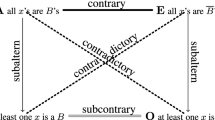Abstract
A quasigroupQ is a set together with a binary operation which satisfies the condition that any two elements of the equationxy =z uniquely determines the third. A quasigroup is in indempotent when any elementx satisfies the indentityxx =x. Several types of Tactical Systems are defined as arrangement of points into “blocks” in such a way as to balance the incidence of (ordered or unordered) pairs of points, and shown to be coexistent with idempotent quasigroups satisfying certain identifies. In particular the correspondences given are: 1. totally symmetric idempotent quasigroups and Steiner triple systems, 2. semi-symmetric idempotent quasigroups and directed triple systems, 3. idempotent quasigroups satisfying Schröder's Second Law, namely (xy)(yx)=x, and triple tourna-ments, and 4. idempotent quasigroups satisfying Stein's Third Law, namely (xy)(yx)=y, and directed tournaments. These correspondences are used to obtain corollaries on the existence of such quasig-roups from constructions of the Tactical Systems. In particular this provides a counterexample to an ”almost conjecture“ of Norton and Stein (1956) concerning the existence of those quasigroups in 3 and 4 above. Indeed no idempotent qnasigroups satisfying Stein's Third Law and with order divisible by four were known to N. S. Mendelsohn when he wrote a paper on such quasigroups for the Third Waterloo Conference on Combinatorics (May, 1968). Finally, a construction for triple tournaments is interpreted as a Generalized Semi-Direct Product of idempotent quasigroups.
Similar content being viewed by others
References
Baker, R. D. andWilson R. M.,The Whist-tournament problem of E. H. Moore. To appear.
Bermond, J. C.,An application of the solution of Kirkman' s Schoolgirl problem: the decomposition of the symmetric oriented complete graph into 3-circuits. DiscreteMath.8 (1974), 301–304.
Brayton, R. K., Coppersmith, D. andHoffman, A. J.,Self-orthogonal latin squares of all orders n≠2, 3,6. Bull. Amer. Math. Soc.80 (1974), 116–118.
Denes, J. andKeedwell, A. D.,Latin Squares and Their Applications. Academic Press, New York, 1974.
Hung, S. H. Y. andMerdelsohn, N. S.,Directed triple systems. J. Combinatorial Theory, Set. A14 (1973), 310–318.
Kraitchik, M.,Mathematical Recreations. Dover, New York, 1953.
Mendelsohn, N. S.,Combinatorial designs as models of universal algebras. In: Recent Progress in Combinatorics, Academic Press, New York, 1969, 123–132.
Mendelsohn, N. S.,A natural generalization of Steiner triple systems. In: Computers in Number Theory, A. O. L. Atkin and B. J. Birch eds., Academic Press, New York, 1971, 323–338.
Moore, E. H.,Tactical memoranda I-III. Amer. J. Math.18 (1896), 264–303.
Norton, D. A., andStein, S. K.,Cycles in algebraic systems. Proc. Amer. Math. Soc.7 (1956), 999–1004.
Sade, A.,Quasigroupes demi-symetriques. Ann. Soc. Sci. Bruxelles Ser. I79 (1965), 133–143.
Wilson, R. M.,Constructions and uses of pairwise balanced designs. NATO Adv. Study Inst. on Combinatorics, Breukelen, The Netherlands, July, 1974.
Author information
Authors and Affiliations
Rights and permissions
About this article
Cite this article
Baker, R.D. Quasigroups and tactical systems. Aeq. Math. 18, 296–303 (1978). https://doi.org/10.1007/BF03031680
Received:
Accepted:
Issue Date:
DOI: https://doi.org/10.1007/BF03031680



